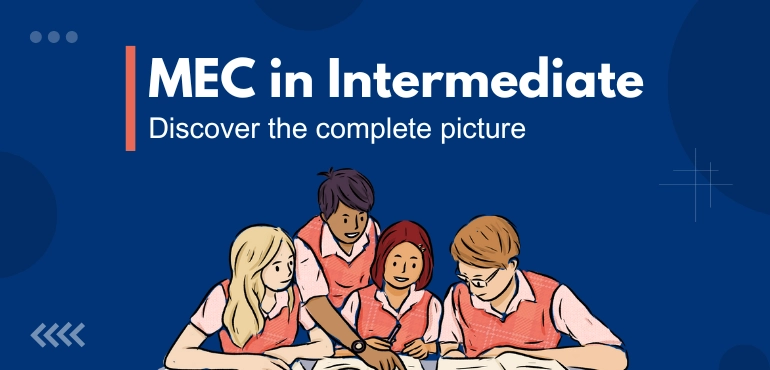
MEC is one of the most popular courses that students prefer along with MPC and BiPC. This course lays a solid foundation to pursue some amazing courses after intermediate that will help students bag high-paying jobs both in India and abroad.
Career options after Intermediate MEC exam include Chartered Accountancy which is one of the highest-paying careers in India and across the world. CA can be quite time-consuming and extremely challenging and its difficulty level is rated almost equal to some of the toughest exams in India like UPSC and CAT. Apart from CA, there are some interesting career opportunities like BBA, Bcom, BA, etc. after MEC in Intermediate that offer fairly rewarding career opportunities after finishing higher studies.
What is the MEC Course? For whom is this stream ideal?
The full form of MEC is Maths Economics and Commerce which is one of the popular courses in intermediate. Anyone who completed their tenth standard from a recognized board is eligible to take up this course. In this two-year intermediate course, students have to study the three major subjects along with the first and second languages.
In both Telangana and Andhra Pradesh, the curriculum is almost the same in all the institutes, and the maximum marks in the entire course are 1000. MEC is important for students who are interested in the fields of finance, accounting, statistics, etc. This course lays a foundation in the areas of mathematics and accounting for the practical application of these concepts in the real business world. After finishing this course, students can also pursue UG abroad for which it’s advised to start the preparation a little earlier to increase the chances of getting admission into foreign universities.
Syllabus of MEC Course in Intermediate first year:
As discussed earlier, there are three major subjects namely Mathematics, Economics, and Commerce in the MEC Course of Intermediate. There are two papers in mathematics and one paper in economics. The commerce subject is divided into two parts, one is commerce and the second one is accountancy. Now, let’s look at the syllabus of each of the subjects in the MEC intermediate first year.
Syllabus of Mathematics- 1A:
Unit-1: Functions
Unit-2: Mathematical Induction
Unit-3: Matrices
Unit-4: Addition of Vectors
Unit-5: Product of Vectors
Unit-6: Trigonometric Ratios up to Transformations
Unit-7: Trigonometric Equations
Unit-8: Inverse Trigonometric Functions
Unit-9: Hyperbolic Functions
Unit-10: Properties of Triangles
Syllabus of Mathematics- 1B:
Unit-1: Locus
Unit-2: Transformation of Axes
Unit-3: The Straight Line – Introduction
Unit-4: Pair of Straight Lines – Introduction
Unit-5: Three-Dimensional Coordinates – Introduction
Unit-6: Direction Cosines and Direction Ratios – Introduction
Unit-7: The Plane
Unit-8: Limits and Continuity
Unit-9: Differentiation
Unit-10: Applications of Derivatives Introduction
Syllabus of Economics in inter-first year:
Unit-1: Introduction to Economics
Unit-2: Theories of Consumer Behaviour
Unit-3: Demand Analysis
Unit-4: Production Analysis
Unit-5: Market Analysis
Unit-6: Theories of Distribution
Unit-7: National Income Analysis
Unit-8: Theories of Employment and Public Finance
Unit-9: Money, Banking, and Inflation
Unit-10: Basic Statistics for Economics
Syllabus of Commerce in inter-first year:
Unit-1: Fundamentals of Business
Unit-2: Forms of business organizations
Unit-3: Formation of a company as per the Companies Act, 2013
Unit-4: Sources of Business Finance
Unit-5: MSMEs & MNCs
Syllabus of Accountancy in inter-first year:
Unit-1: Introduction to Accounting
Unit-2: Subsidiary Books
Unit-3: Cash Book and Bank Reconciliation Statement
Unit-4: Trial Balance and Rectification of Errors
Unit-5: Final Accounts
Syllabus of MEC Course in intermediate second year:
The subjects are going to be the same in both the first and second years of intermediate for the MEC stream and the maximum marks are also going to be the same. Let’s check out the complete syllabus of each of mathematics, economics, and commerce for the second year of intermediate.
Syllabus of Mathematics- 2A:
Unit-1: Complex Numbers
Unit-2: De Moivre’s Theorem
Unit-3: Quadratic Expressions
Unit-4: Theory of Equations
Unit-5: Permutations and Combinations
Unit-6: Binomial Theorem
Unit-7: Partial Fractions
Unit-8: Measure of Dispersion
Unit-9: Probability
Unit-10: Random Variables and Probability Distributions
Syllabus of Mathematics- 2B:
Unit-1: Circle
Unit-2: System of Circles
Unit-3: Parabola
Unit-4: Ellipse
Unit-5: Hyperbola
Unit-6: Integration
Unit-7: Definite Integrals
Unit-8: Differential Equation
Syllabus of Economics in inter-second year:
Unit-1: Economic Growth and Economic Development
Unit-2: Demography and Human Resource Development
Unit-3: National Income, Poverty, and Unemployment
Unit-4: Planning and NITI Aayog
Unit-5: Agricultural Sector
Unit-6: Industrial Sector
Unit-7: Tertiary Sector
Unit-8: Foreign Sector
Unit-9: Environmental Economics
Unit-10: Telangana Economy
Syllabus of Commerce in inter-second year:
Unit-1: Financial Markets and Stock Exchange
Unit-2: Business Services, Banking, and Other Services
Unit-3: Entrepreneurship and Entrepreneurship Development
Unit-4: Internal and International Trade
Unit-5: Principles and Functions of Management
Syllabus of Accountancy in inter-second year:
Unit-1: Depreciation and Accounting from Incomplete Records
Unit-2: Consignment Accounts
Unit-3: Accounting for Not-for-Profit Organisations
Unit-4: Partnership Accounts
Unit-5: Computerised Accounting System
Marks Distribution for MEC Course:
There are a total of five subjects in the entire curriculum of this course. The first language will be English and students have to choose a second language among the available options Telugu, Sanskrit, Urdu, etc.(options vary depending on their board). Both the first and second languages have maximum marks of hundred each.
Maths A and Maths B will be conducted for 75 marks each. However, the score will be calculated out of 50 for each of Maths A and Maths B, and both of them will be added to calculate the mathematics exam score out of 100.
The economics exam will be conducted for a hundred marks. In commerce, there are two sections. One is commerce and the other is accounting. Each paper is conducted for 50 marks and will be combined at the end to calculate the score out of hundred for the commerce section.
So, the maximum marks will be 500 in the first year and 500 in the second year and hence the final score will be given out of 1000 at the end of MEC in the intermediate course.
| Subject | Maximum Marks | Passing Marks |
|---|---|---|
| First Language(English) | 100 | 35 |
| Second Language | 100 | 35 |
| Mathematics- A | 75 | 27 |
| Mathematics- B | 75 | 27 |
| Economics | 100 | 35 |
| Commerce | 100 | 35 |
Major UG courses after MEC in Intermediate
MEC course is just a foundation and to excel in a career, students need to complete their higher education from reputed universities in high-demand courses to grab well-paying job opportunities. Let’s have a look at some of the popular UG courses that students can take up after completing MEC in Intermediate.
Chartered Accountancy, BBA, BCom, BA in Economics, and BCA are some of the major UG courses that students can take up after MEC in Intermediate. Apart from these courses, students get eligibility to take up various commerce and arts courses along with some science courses after MEC. However, it’s advisable to check the respective university before planning to apply for a particular course.
Career opportunities after the MEC Course
No matter which course, you take up, it’s worth nothing if it doesn’t help you reach great heights in your life and the same applies to MEC as well. When compared to popular courses like MPC and BiPC, the career scope with this course might seem less interesting but if planned properly students can bag high-paying jobs with MEC intermediate once they finish higher education.
Here are some of the exciting career opportunities that students benefit from after finishing graduation with MEC in Intermediate.
| class 11th | UG . | Career Opportunities |
|---|---|---|
| MEC | Chartered Accountancy | Financial Analyst, Corporate Finance Professional, Tax Consultant, Business Analyst, Chief Financial Officer, etc. |
| BBA | Marketing Executive, Sales Representative, Business Development Executive, Customer Service Executive, etc. | |
| BCom | Accountant, Financial Analyst, Auditor, Tax Consultant, Business Analyst, etc. | |
| BA in economics | Economist, Marketing Manager, Financial Analyst, Credit Analyst, etc. | |
| BCA | Software Developer, Data Analyst, Blockchain Developer, Digital Marketer, etc. |
MEC VS MPC | Which stream is better for you?
It largely depends on the interests and aspirations of the student. If you are interested in creating something using technology that solves a problem, MPC could be an ideal choice for you. If you are passionate about numbers and their practical applications in business, MEC can offer you a fantastic life. To bust confusion regarding whether MEC is a better fit for you or not, check out the popular courses after Inter MEC. An important fact over here is that, with MPC, you can do almost everything you do after MEC but the vice-versa is not true. But, it doesn’t mean that MEC is inferior to MPC as both courses were curated with a purpose and it depends on the student how they utilize each course for the upliftment of their careers.
Popular Courses to Study Abroad After MEC Course in Intermediate
There are plenty of valuable courses available to study abroad in various verticles after finishing MEC in Intermediate. Some of the popular UG courses that students can pursue are finance, accounting, management, and marketing. But, it’s important to remember the importance of profile building along with good academic performance to pursue in-demand courses in foreign universities.
Let’s check out the popular courses that are available for MEC intermediate students in some top universities abroad.
| University | Popular Courses |
|---|---|
| Massachusetts Institute of Technology (MIT) | Bachelor of Science in Economics, Bachelor of Science in Management Science, Bachelor of Science in Finance, Bachelor of Science in Mathematical Economics |
| University of Cambridge | BA (Hons) Economics, BA (Hons) Land Economy |
| University of Oxford | BA (Hons) in Economics and Management, BA Mathematics, |
| Harvard University | Bachelor of Arts in Economics |
| Stanford University | Bachelor of Arts in Economics |
| National University of Singapore (NUS) | Bachelor of Social Sciences in Economics, Bachelor of Science in Quantitative Finance, BBA in Marketing, Bachelor of Business Administration (Accountancy) |
| UCL | Statistics, Economics, and Finance BSc, Mathematics with Management Studies BSc, |
| University of California, Berkeley (UCB) | Bachelor of Science (BS) in Business Administration, Bachelor of Arts (BA) in Operations Research and Management Science |
| University of Chicago | BA in Economics |
| University of Pennsylvania | BS Finance, BA in Mathematical Economics, Marketing, BS BA in Economics |
How to Prepare during MEC in Intermediate to Study Abroad?
No matter which course you choose, you need to prepare for certain exams to study in the top universities abroad. The same is the case for MEC in intermediate as well. There are basically two types of exams to study abroad. Standardized tests like the SAT and ACT test your readiness for college. Language proficiency tests like IELTS and TOEFL need to be cleared to prove your English language proficiency if you are from a country where English is not the native language.
If you are serious about studying abroad, programs like intermediate with integrated SAT can potentially increase your chances of getting admission into popular universities abroad. It is important to start the preparation as early as possible preferably from the first year of intermediate to stay ahead of the competition.
Conclusion:
To conclude, MEC in intermediate is ideal for students with an aspiration to pursue their careers in the field of finance and accountancy. Apart from these popular fields, there are numerous areas of businesses that MEC students can help grow after finishing their higher education.
After MEC in intermediate, students can take up various courses in BCom, BBA, and BA and can also pursue an MBA after UG to solidify their career. As discussed earlier, CA is one of the most lucrative career options to choose after MEC intermediate but it’s a little time-consuming and tests the patience of the student to a great extent. So, do your groundwork properly and sketch your career plan well in advance to succeed in your career after finishing your MEC in Intermediate.
FAQs:
Yes, but MEC students are not eligible for all kinds of B-sc courses. It’s important to check the eligibility criteria with the university which offers a particular BSc course. Generally, MEC students can’t take up science courses that have subjects like Physics, Chemistry, and Zoology as major subjects but can apply for BSc courses that have Maths and statistics as major subjects.
Yes, you can! After finishing your MEC in intermediate, finish your graduation in any of the popular courses like BA, BBA, or BCom and then prepare for the exams like CAT to pursue an MBA. If you want to pursue your MBA abroad, prepare for exams like GMAT.
Chartered Accountancy, Financial Consultant, Accountant, Sales Manager, and Head of Marketing are only a few of the numerous career opportunities after higher education with MEC in Intermediate.
First, define your objectives and then search for the institute that offers courses that align with your aspirations. If CA is your aim, search for popular institutes with a high success rate and positive feedback from alumni. If studying abroad after MEC intermediate is your aim, then consider taking up courses from institutes like Texas International Academy that offers MEC with an integrated SAT program to take up UG programs in the best universities abroad.
As there is not much guidance available about this wonderful course, students usually waste their two years of intermediate just by studying for the board exams. If they simultaneously prepare for the entrance exams to take up popular UG courses, there are tremendous opportunities both in India and abroad which usually many students miss due to lack of proactivity.








